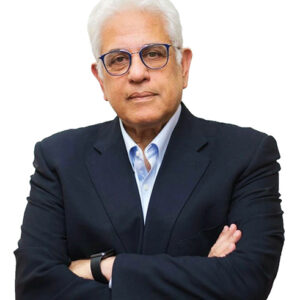The thoughts expressed in this piece are solely those of the author.
What are the true purposes of higher education in any nation? What do we expect from it and for it? One might assume the answers are obvious to everyone, yet even some specialists remain unclear. Higher education is the type of learning that shapes the future. It builds people capable of driving development — not merely fulfilling present needs. It cultivates individuals who create and realize opportunities, not merely benefit from them.
Throughout history, universities have played numerous social roles. This variety defines their unique institutional identities. All universities must simultaneously grow, spread and evolve, while also understanding when to change and when to preserve traditions. To do so, they must question accepted knowledge and test prevailing patterns of thought within society.
Moreover, universities must take risks in presenting the unexpected to societies that prefer the status quo and resist innovation — often to preserve familiar yet flawed realities. Universities are engines of change. Their role is to innovate, absorb new knowledge, generate and transmit it, and adapt that knowledge to our current needs and future aspirations.
Universities are founded on two essential axes: one that shifts from immediate existence (comfort and welfare) to the pursuit of truth, and another that moves from opposition (critique) to contribution (social productivity). The pursuit of harmony between these roles is embedded in the very word “university,” suggesting a unity of purpose. Modernization is a fundamental mission of universities across all societies. In order to define and understand modernity — its implications for social change and scientific advancement — universities, as essential institutions and cultural pillars, must assess their environments and recognize the complexities of transformation. This requires academic freedom and institutional autonomy.
Practically speaking, this means identifying strategies that lead to institutional policies that are testable, measurable, and accountable.
I recently attended an important conference in Stockholm, Sweden, for the Magna Charta Ambassadors of Living Values — a project that aims to embed the principles of the Bologna Process into the ethos of university governance, involving administrators, faculty, students and staff to create a better academic community. The Magna Carta includes foundational principles:
First, the university is an independent institution at the heart of society. It produces, evaluates and shares culture through research and education. Its academic work must remain ethically and intellectually independent from political or economic power.
Second, freedom in research and teaching is the core of university life. Governments and universities must each ensure this freedom is protected, promoting dialogue and rejecting intolerance.
In a paper I co-authored with Swiss colleague Andrea Barban titled “Universities: Civilization Builders or Service Providers?” We argued that universities should fulfill four goals: achieving welfare, promoting order, offering meaning and seeking truth.
We concluded with a powerful quote from Taha Hussein in his classic work “The Future of Culture in Egypt”: “The university does not merely produce scientists, but cultivates the cultured, civilized human being — not just someone educated, but one who becomes a source of culture; not just someone civilized, but one who advances civilization.”
Why do I write this? Because today, even in the stronghold of liberty — the United States — universities are under attack by the Trump administration, which I believe could influence the global values of higher education.
The New York Times wrote on March 16: “When a political leader seeks to push democracy toward authoritarianism, he often begins by undermining independent sources of information and accountability. He tries to delegitimize judges, sideline independent agencies and muzzle the media.
President Vladimir Putin of Russia has done so for more than 25 years. To varying degrees, so have Prime Minister Viktor Orbán of Hungary, Prime Minister Narendra Modi of India and President Recep Tayyip Erdoğan of Turkey.”
Undermining higher education is often a key part of this strategy. Academic researchers are meant to seek truth — and rising autocrats know that empirical truth can threaten their power. Putin once said, “Wars are won by teachers.” Yet he and Erdoğan have closed universities. Modi’s government has jailed dissenting scholars. Orbán appointed loyalists to oversee academic institutions.
The New York Times continued: “Trump has not yet matched these other leaders in dismantling democracy, but it would be naive to ignore his initial steps to follow their path.”
He has fired inspectors general, military leaders, prosecutors,and national security experts. He has sued media outlets and threatened other institutions. He has implied that judges cannot restrain him.
He called the arrest of pro-Palestinian protest leader Mahmoud Khalil at Columbia University “the first of many,” signaling his intent to suppress free expression among university students, particularly immigrants.
He wrote on social media: “Those who save their country break no law.” A familiar claim of dictators throughout history.
The Times added, “Trump’s multi-pronged assault on higher education is central to his effort to weaken institutions that challenge his narrative of reality.”
More importantly, he is enacting or contemplating deep cuts in university funding. His administration has already slashed federal payments that cover the indirect costs of research. Vice President J.D. Vance and other Republicans have pushed to raise the endowment tax that Trump introduced during his initial term. Together, these policies could devastate the budgets of leading research institutions.
Trump is tightening the squeeze on higher education in other ways. The Department of Education has laid off nearly half its staff, hindering student access to financial aid.
The near-total dismantling of USAID eliminated $800 million in grants to Johns Hopkins University alone. On March 7, his administration targeted a single institution — Columbia University — cutting $400 million in grants, allegedly for failing to respond adequately to campus antisemitism.
American leadership in science and medicine depends on federal funding. Private companies, even large ones, rarely conduct basic research — too risky, with no guaranteed profit. Even successful experiments may take decades to yield returns. This is where the noncommercial, long-term vision of the state becomes essential.
The Times concluded: “In recent years, too many faculty and university officials at elite American institutions have acted more as liberal ideologues than seekers of truth. They have silenced debates on legitimate topics — from COVID policies to gender identity treatments and DEI programs. A 2024 Harvard survey found that nearly 70% of seniors felt uncomfortable expressing their views on controversial subjects.”
I stand firmly in support of academic freedom and institutional autonomy for the youth who will shape the future—not just in Egypt, but across the world.
This article first appeared in July’s print edition of Business Monthly.




